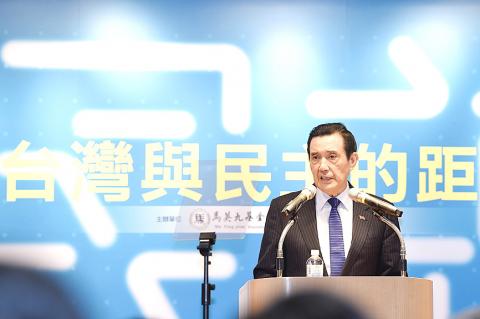President Tsai Ing-wen (蔡英文) has no right to criticize the Hong Kong government over an extradition bill, as Taiwan is becoming increasingly undemocratic under her rule, former president Ma Ying-jeou (馬英九) said yesterday.
Ma made the remarks at an academic conference on democracy held by the Ma Ying-jeou Foundation and the Fair Winds Foundation in Taipei.
The Republic of China (ROC) appears to have turned into an authoritarian country after the Democratic Progressive Party (DPP) set up the Ill-gotten Party Assets Settlement Committee to control the assets of the Chinese Nationalist Party (KMT) and its “so-called” affiliates, Ma said.

Photo: George Tsorng, Taipei Times
As a result, the KMT was forced to lay off many of its staff and cannot even access its assets unless approved by the committee, he said.
“That an opposition party’s assets would be controlled by the ruling party is rarely seen anywhere in the world,” he said.
The Act Governing the Settlement of Ill-gotten Properties by Political Parties and Their Affiliate Organizations (政黨及其附隨組織不當取得財產處理條例) and the Act on Promoting Transitional Justice (促進轉型正義條例), passed by the DPP-controlled legislature, seem to target the KMT, he said.
Both laws allowed the DPP administration to establish supposedly independent committees that are not actually independent and are likely unconstitutional, Ma said.
More than 400 of the people the Transitional Justice Commission exonerated at the end of last year were the Chinese Communist Party’s undercover agents, he said.
Their names can still be found at monuments in Beijing, he said, adding that exonerating them was inconsiderate for the families of those they allegedly killed.
Tsai’s “so-called” transitional justice does not bring reconciliation, but instead revives authoritarianism, he added.
While the extradition bill proposed by the Hong Kong government would undermine people’s freedom and democracy, “Tsai is worse” for making the DPP pass amendments to the Referendum Act (公民投票法) last month to restrict people’s freedom and political rights, he said.
Tsai has no right to criticize the Hong Kong government, yet she used the issue to manipulate people into supporting her, he said.
As suggested in the book How Democracies Die by Steven Levitsky and Daniel Ziblatt, a democracy dies when an authoritarian leader abuses their power to completely dominate an opposition party, Ma said.
“Is it not what is happening in Taiwan?” he asked.

South Korean K-pop girl group Blackpink are to make Kaohsiung the first stop on their Asia tour when they perform at Kaohsiung National Stadium on Oct. 18 and 19, the event organizer said yesterday. The upcoming performances will also make Blackpink the first girl group ever to perform twice at the stadium. It will be the group’s third visit to Taiwan to stage a concert. The last time Blackpink held a concert in the city was in March 2023. Their first concert in Taiwan was on March 3, 2019, at NTSU Arena (Linkou Arena). The group’s 2022-2023 “Born Pink” tour set a

CPBL players, cheerleaders and officials pose at a news conference in Taipei yesterday announcing the upcoming All-Star Game. This year’s CPBL All-Star Weekend is to be held at the Taipei Dome on July 19 and 20.

The Taiwan High Court yesterday upheld a lower court’s decision that ruled in favor of former president Tsai Ing-wen (蔡英文) regarding the legitimacy of her doctoral degree. The issue surrounding Tsai’s academic credentials was raised by former political talk show host Dennis Peng (彭文正) in a Facebook post in June 2019, when Tsai was seeking re-election. Peng has repeatedly accused Tsai of never completing her doctoral dissertation to get a doctoral degree in law from the London School of Economics and Political Science (LSE) in 1984. He subsequently filed a declaratory action charging that

The Hualien Branch of the High Court today sentenced the main suspect in the 2021 fatal derailment of the Taroko Express to 12 years and six months in jail in the second trial of the suspect for his role in Taiwan’s deadliest train crash. Lee Yi-hsiang (李義祥), the driver of a crane truck that fell onto the tracks and which the the Taiwan Railways Administration's (TRA) train crashed into in an accident that killed 49 people and injured 200, was sentenced to seven years and 10 months in the first trial by the Hualien District Court in 2022. Hoa Van Hao, a